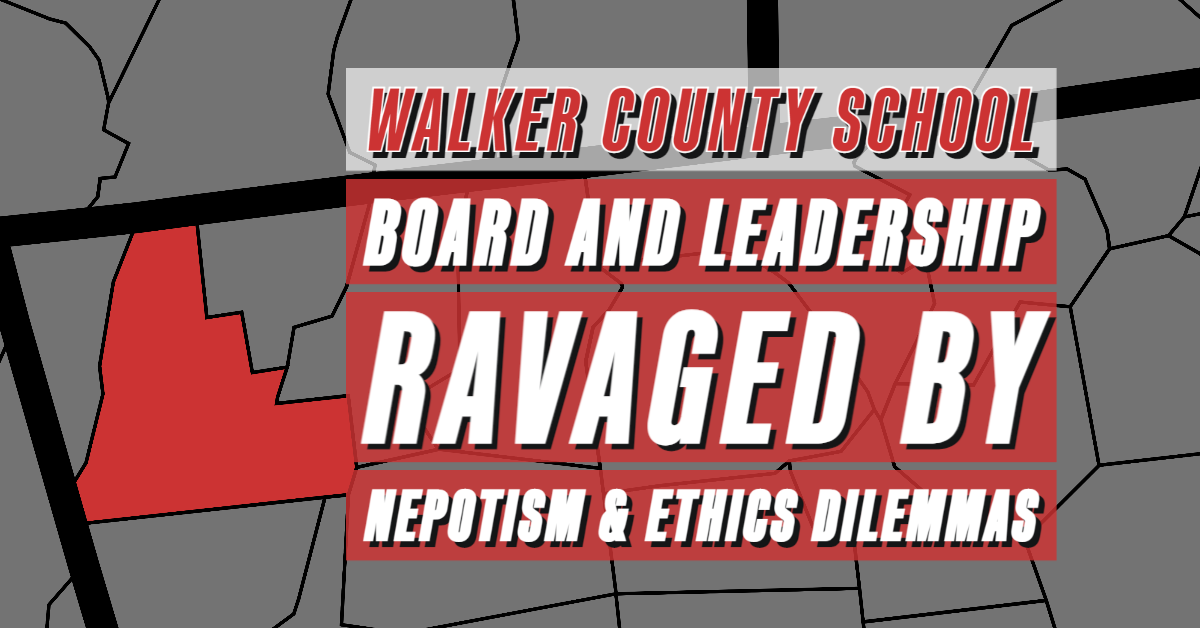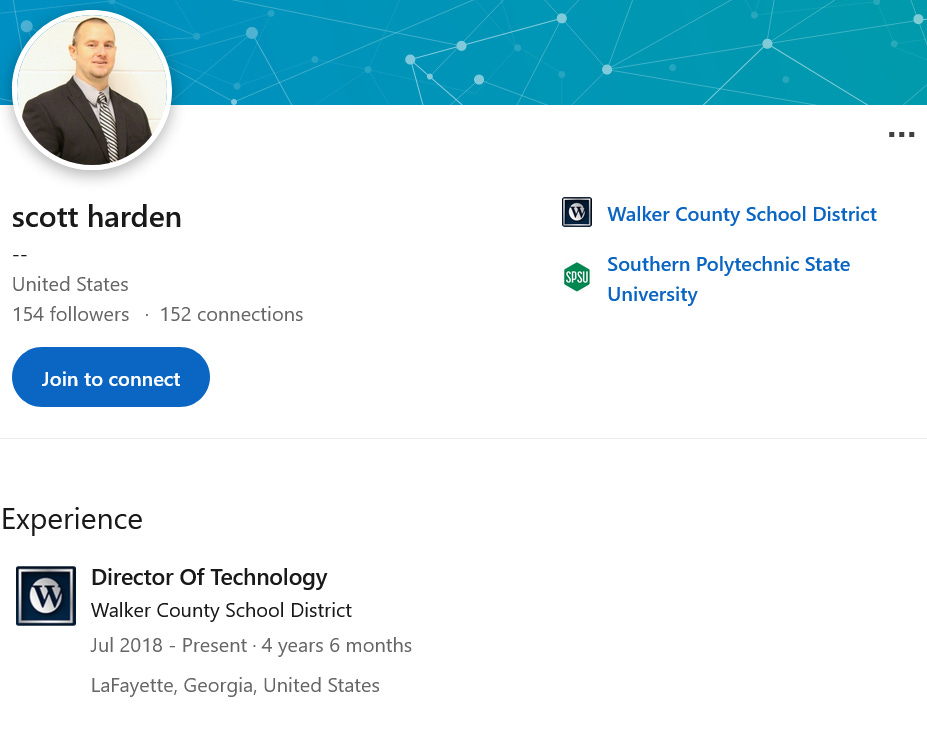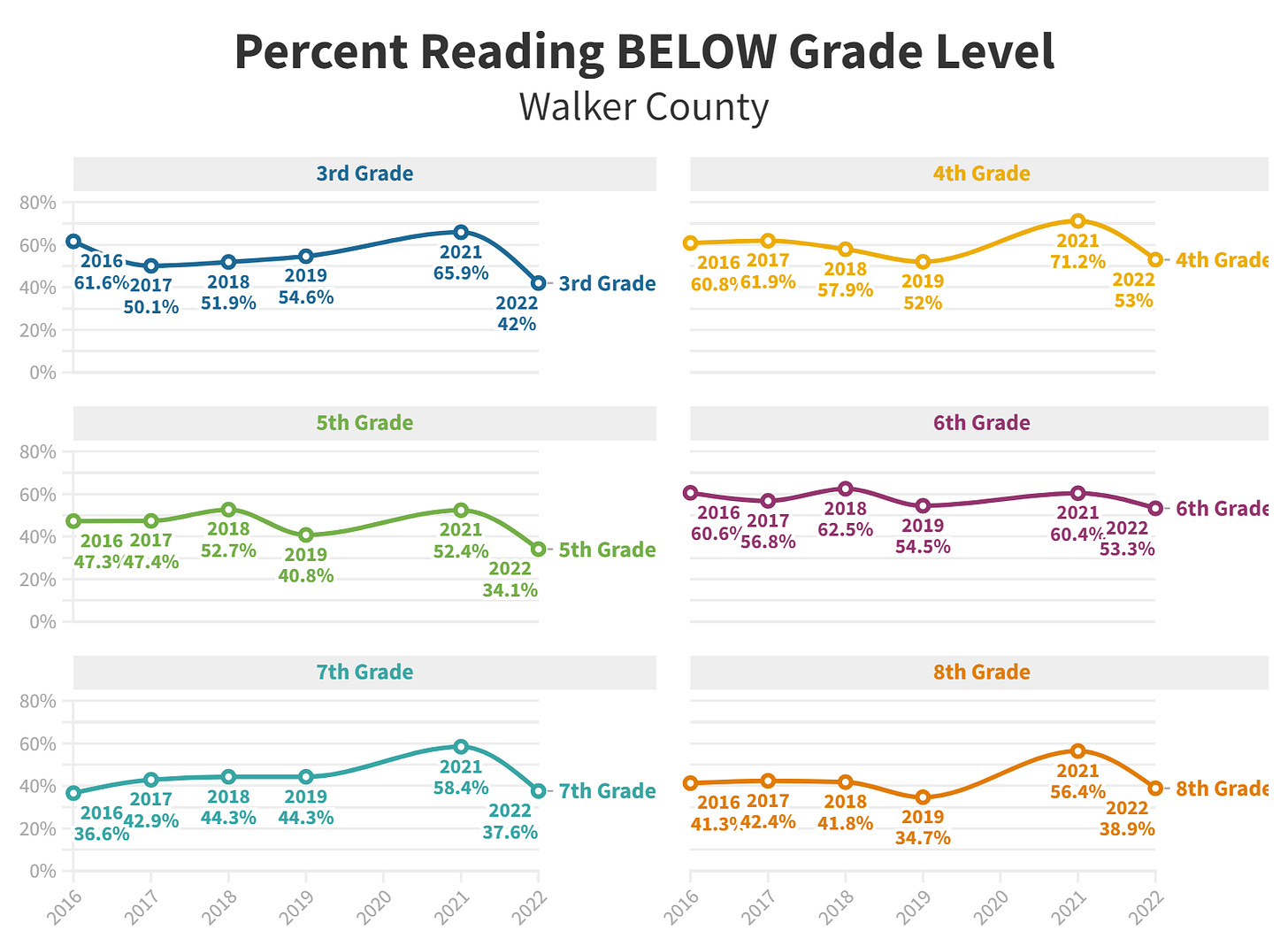Walker School Board & Leadership Ravaged By Nepotism and Ethics Dilemmas
Six Walker Elem. Schools added to Fed. Support & Improvement List | Nepotism & Ethics Issues: Should Board Members Resign? Or Have Consequences and Accountability Been Cast Aside For Adults Too?
It has been more than a century since Walt Whitman spoke of the never-ending audacity of government officials. It remains true today as it was then. Walker County's board of education and district leadership abundantly demonstrate this in northwest Georgia. Four school board members have been in clear violation of both state laws governing eligibility to serve as well as ethics and nepotism policies.
In This Post:
A Look At The Rules
In 2010, the Georgia General Assembly passed Senate Bill 84, changing several provisions related to local boards of education, including:
provisions relating to the eligibility for election as a local board of education member;
provide for the fundamental role of local boards of education and local school superintendent;
prohibit certain conflicts of interest of board members;
provide for a code of ethics for local board of education members;
Following SB84's signing, the State Board of Education enacted Rule 160-5-1-.36, which echoed SB84's requirements. The Georgia Department of Education also produced a guidance document to help local school boards implement ethics and nepotism policies. The following is an excerpt from that document.
Each LBOE shall adopt policies regarding nepotism including the minimum following provisions:
The local board should adopt its nepotism policy consistent with the manner in which it adopts all local board policies.
The nepotism policy should clearly state that on or after July 1, 2009, individuals are not eligible for election or appointment as a LBOE member if:
An immediate family member sits on the same LEA’s local board.
An immediate family member serves as the local school superintendent, principal, assistant principal, or system administrative staff of the same LEA if the immediate family member’s employment in that position began on or after January 1, 2010.
An immediate family member is defined in the SBOE rule 160-5-1-.36 Local School Board Governance and O.C.G.A. § 20-2-63 as a spouse, child, sibling, or parent or the spouse of a child, sibling, or parent. System administrative staff is not defined in SBOE rule but may be by local board policy and is commonly referred to as employees of the local school district assigned to duties other than instructing students.
The Walker Board of Education
Mike Carruth is currently a member of the Walker County Board of Education. He was first elected in 2004.
Justin Carruth is the son of Mike Carruth and currently works for the Walker County Board of Education. His current position is vocational director(title from state salary database) or CTAE director/coordinator, which began on or after 7/1/2021. His previous position was as an assistant principal, which began on or after 7/1/2018. Before that, he had been a teacher in grades 9-12. His first employment as a teacher in Walker County began after 1/1/2010.
Karen Harden is currently a Walker County Board of Education member appointed in January 2022 and recently re-elected.
Scott Harden is the son of Karen Harden and works for the Walker County Board of Education. His current position is technology director (title from state salary database) or technology coordinator, which began on or after 7/1/2018. Before that, he worked as a graduation specialist and grade 9-12 teacher for the Walker County Board of Education. His first employment as a teacher in Walker County began before 1/1/2010.
Karen Stoker was first elected to the board in 2011 and is currently a member. She has a sister who is married to fellow board member Dale Wilson.
Dale Wilson was first elected to the board in 2011 and is currently a member. He is married to the sister of fellow board member Karen Stoker.
Phyllis Hunter has no immediate family members on the board or in district leadership or staff.
We know that state law and school board policies clearly define immediate family members to include children and brothers/sisters-in-law. And we know that administrative staff is "commonly referred to as employees of the local school district who are not instructional." So the question is, how is it that these four members are still in office?
During the 2020 election, Dale Wilson and Karen Stoker faced challenges to their qualifications. The Superior Court performed a lobotomy on the English language and Georgia law to arrive at a decision that rejected the challenge. It was then appealed to the Georgia Supreme Court. The Court denied the petition to hear the appeal. Considering this was happening during the height of the pandemic, it's not hard to think that the extraordinary events unfolding at the time influenced the Court's decision. You may read the appeal here, which sets out the facts and arguments in better writing than you'll read here.
As to Mike Carruth and Karen Harden, I emailed Walker County Superintendent Damon Raines asking, "If the above points are undisputed, then how are Carruth and Harden not ineligible for school board service?"
I received the following response.
Mr. Pierce,
The titles you referenced as it pertains to both Justin Carruth and Scott Harden are only designations from the Georgia Department of Education; they are paid by Walker County Schools as Coordinators according to their job assignments, duties, and responsibilities and work directly under the supervision of a Director in charge of the respective departments.
Justin Carruth-Coordinator of CTAE and High School Curriculum
Scott Harden-Coordinator of Technology
Your statements regarding Mr. Mike Carruth and Ms. Karen Harden and their current status and election information are factual.
The Board is aware of some concerns expressed about this matter and has previously sought and obtained additional guidance from the Attorney General's Office and the State Department of Education. The Attorney General's office and the State Department of Education advised that, while there is no definition of "system administrative staff" in the statute or case law, the term likely includes only the highest-level system administrative employees, such as personnel director or facilities director, or other director position. The term does not include "middle management" positions.
Based on the descriptions of Justin Carruth's and Scott Harden's jobs, the Attorney General's Office and the State Department of Education did not believe those positions were highest-level system administrative positions but were more in line with middle management positions.
Accordingly, both had the opinion that neither OCGA 20-2-51 nor Policy BHB preclude Board Members Carruth and Harden from serving on the Board under the circumstances, and confirmed what the Board had believed to be the law.
Kind regards,
Damon
Damon Raines
Superintendent, Walker County Schools
201 South Duke Street
LaFayette, Georgia 30728
A Ridiculous Answer
First, all due respect to the attorney general, the state department of education, and the superintendent, but that answer is ridiculous. In 2010, the DOE issued a policy guidance document that defined the positions that would commonly be considered system administrative staff. Far from only encompassing the highest level positions, the guidance states, "employees of the local school district assigned to duties other than instructing students."
Using the superintendent's approach, he could simply change the title of any position to skirt the nepotism provision. Rather than the title of the job, what matters is its function.
Not only do the state salary records list both employees as directors, but after checking surrounding school district employees with the same title on state records against the titles listed on their school district websites, the titles were similar and director-level. For example, the state salary records show an employee from Dade County and Catoosa County with the same title as Scott Harden, technology director. However, their school district website lists them as technology directors, yet Walker's superintendent describes Harden as a coordinator. Meanwhile, Harden's LinkedIn profile leaves no ambiguity.
Moreover, Scott Harden earned more in 2021 than 109 other technology directors across the state, some from larger districts. If his role is not that of a technology director, then why is he compensated so well for a less important role?
As for Justin Carruth, the superintendent's answer ignored that Carruth was an assistant principal from 2018 to 2021. Referring to the above law and rules, assistant principal is one of the positions explicitly listed as disqualifying for the board member if the person is an immediate family member, which was the case for Mike Carruth. This is is an irrefutable violation of the eligibility statute and state board of education rules.
Additionally, under the state local board governance rules, each board member is required to "annually disclose compliance with the State Board of Education's policy on training for members of local boards of education, the code of ethics of the local board of education, and the conflict of interest provisions applicable to members of local boards of education." Presumably, Carruth has complied with his annual requirement. Was his son’s position then and now an accidental oversight?
Also, any arguments about being grandfathered in don't hold up. Following the law's passage in 2010, the State Board and DOE produced guidance documents and PowerPoint presentations on this topic. When records exist that illuminate, in bright light, what should always be plain language in the state code, there is no need to interpret the law for legislative intent.
I believe that a few million Georgians would be interested in hearing more if state agencies like the Department of Education intend to adopt the ubiquitous federal practice—chevron deference—and change the meaning of the law as the agency's administration changes. I suspect most Georgians share the view of Chief Justice Marshall's axiom, "[it] is the responsibility and province of the judicial department to explain the law."
Why Does All This Matter?
On December 12, the Georgia Department of Education released the federal Targeted Support and Improvement (TSI) schools list. Schools may be placed on the list if it has at least one subgroup performing in the lowest 5% of all schools in at least 50% of CCRPI components, consistently. Not just a one-time score.
On the list were six Walker County schools, all elementary schools. Only Atlanta Public Schools and Fulton County have more schools on the list. This follows the data release of Georgia Milestones assessments that show a significant percentage of students across the district, regardless of grade level, are reading below their grade level at the end of grade.
On August 18, during a planning session meeting, the board voted 3-2 to extend the superintendent's contract. Dale Wilson, Mike Carruth, and Karen Harden voted in favor. Phyllis Hunter and Karen Stoker voted against it.
The thing about ethics policies is that they are a bare minimum. It is impossible to enumerate all behaviors that are acceptable or all activities that should be avoided.
Put yourself in the shoes of a school board member and imagine your child is a district director/coordinator. Would you be able to make a 100% objective decision regarding the contract of the superintendent when that person has the potential to impact your child's career dramatically? It seems unlikely to me. Thus, we can see the reason for ethics and nepotism laws and policies.
Local boards of education set vision and long-term strategies, implement policies, and evaluate and hold school districts accountable. The ethics and nepotism policies assure students and parents that these weighty duties will be carried out free of any cronyism, favoritism, or influence.
Another reason for concern over the violations and governance issues with the Walker County Board of Education is the risk of accreditation probation or revocation. Georgia school districts have faced both in the past due to similar problems.
A Higher Standard
Let me be clear: All the people above are good people with the best intentions. No one of them maliciously intended to break any laws or rules. Add to that, both Scott Harden and Justin Carruth certainly did nothing wrong. They are highly qualified and dedicated to the students of Walker County. As shown in the hypothetical example, rules exist for a reason, but they concern board membership eligibility in this instance.
There has been a lot of talk about the importance of improving civics education for K-12 students and preparing them to be good citizens and productive members of society.
Assuming that's the goal, this whole situation undermines any efforts to inspire students to follow the ideals of a good citizen. In particular, the rule of law. According to the 19th-century philosopher Jeremy Bentham the motto of a good citizen is to obey [laws] punctually; censure freely.
As the very people leading the school system look to avoid the rules on so many occasions, is it any wonder that many adolescents are so cynical about regulations and government? The laws of governance in this situation are clear enough to be comprehended at once by 5th graders, yet the superintendent needs guidance from the attorney general. And even then, that guidance is wrong.
The natural reaction of board members, district leadership, and those who support them will be to dismiss and defend in response to this article. However, it would be a more valuable educational experience for students (and the general public) than any classroom civics lessons they will receive this year if the board and district leadership adopted a different approach.
I suggest they try this: humility, candor, and acceptance of responsibility and consequences.
An example from Aaron Sorkin:
"I was wrong. I was, I was just... I was wrong. Come on, we know that. Lots of times we don't know what right or wrong is, but lots of times we do, and come on... this is one. I may not have had sinister intent at the outset, but there were plenty of opportunities for me to make it right. No one in government takes responsibility for anything any more. We foster, we obfuscate, we rationalize. "Everybody does it", that's what we say. So we come to occupy a moral safe house where everyone's to blame, so no one's guilty. I'm to blame... I was wrong"









The Board with the exception of a couple of members has never been in the classroom ever and Damon Raines has been out of the classroom for nearly two decades. They can’t afford to pay subs but they can afford to pay multiple county administrators six figures. They waste thousands on silly social and character education programs like 7 Mindsets but can’t afford to pay bus drivers enough to keep them. Compare the number of job openings in Walker to Catoosa, Dade, or Whitfield comparatively to the numbers of teachers in those counties and it’s astonishing. Incompetence at every level, with that much control at the Board level one would think the central office has been outstanding in its leadership not near or at the bottom of every conceivable academic category.
Having past experience with a few school systems I found it strange to know that Mr Raines does not hold a doctorate in Education! He is the only school superintendent that I have personally meet that does not hold that title. Another issue I take a large exception to is this appointment of school board members that should be decided by the voters!!